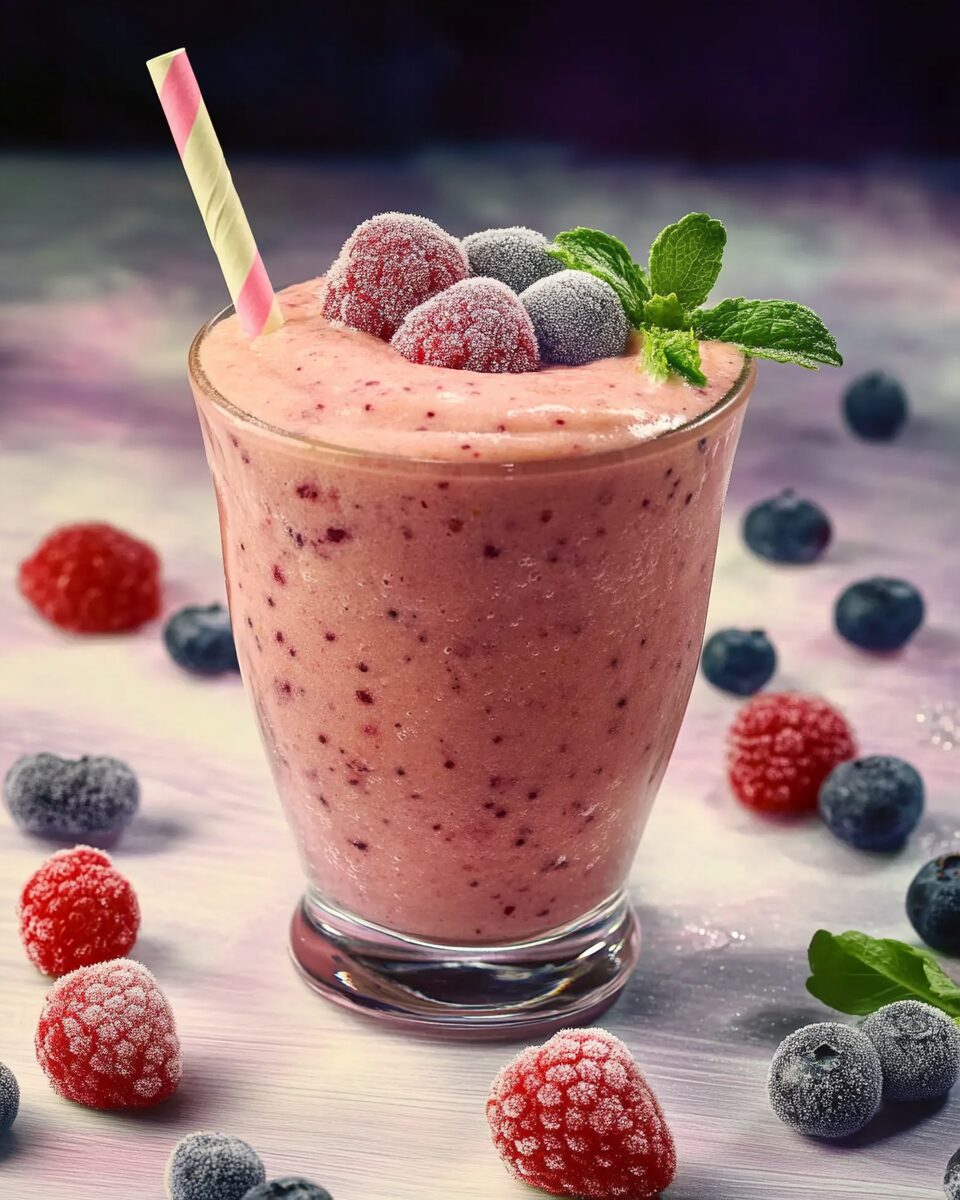In the fast-paced world we live in, quick, easy, and nutritious meal options are essential to maintaining a healthy lifestyle. One of the best ways to ensure you get the nutrients your body needs, even when time is limited, is through smoothies—specifically, frozen fruit smoothies. Packed with vitamins, antioxidants, and other essential nutrients, these vibrant drinks are a versatile solution for breakfast, snacks, or post-workout recovery. The frozen fruit smoothie we discuss today, featuring a delightful combination of fruits and protein-packed Greek yogurt, is not only refreshing but also energizing. Let’s delve into why this smoothie deserves a spot in your daily routine, how it can be customized to your liking, and why it serves as a fantastic option for people of all ages. This article will also explore the various health benefits of incorporating frozen fruits and yogurt into your diet, the flexibility of this smoothie recipe, and how you can creatively adapt it to meet your nutritional needs.
Full Recipe:
Ingredients (Yields 3 servings):
- 9 ounces pineapple juice
- 2 cups assorted frozen fruit (your choice)
- 1 frozen banana (cut into chunks)
- 1 cup vanilla Greek yogurt
Directions:
- Add pineapple juice, frozen fruit, banana, and yogurt into a blender.
- Blend until smooth. If the mixture is too thick, add more pineapple juice for desired consistency.
- Serve and enjoy!
Tip: You can store leftovers in popsicle molds for a refreshing treat later.
Nutritional Information (per serving):
- Calories: 213
- Fat: 2g
- Carbs: 42g
- Protein: 8g
Why Frozen Fruit?
One of the first things that stand out about this smoothie recipe is the use of frozen fruit. Not only does frozen fruit help to create that creamy, frosty texture that many people love in smoothies, but it also holds a lot of nutritional value. While some may believe that fresh fruits are superior in terms of nutrients, frozen fruit can be just as good, if not better, in certain cases.
When fruits are frozen shortly after being harvested, they are preserved at their peak ripeness, locking in vitamins and minerals. Studies show that freezing fruit can help retain most of their nutrients, such as vitamin C, fiber, and antioxidants, that might be lost in fresh fruit during transport or sitting on grocery shelves. By choosing frozen fruits, you not only get a long-lasting ingredient that’s ready when you are, but you also ensure that the fruit maintains its nutritional integrity.
This recipe encourages the use of assorted frozen fruits, such as strawberries, blueberries, raspberries, cherries, and pineapple. Each of these fruits brings its own set of health benefits. For example, blueberries are high in antioxidants and support brain health, while strawberries are rich in vitamin C, helping boost immunity. Pineapples contribute enzymes like bromelain, which aids digestion, while cherries and raspberries provide anti-inflammatory properties.
The Role of Greek Yogurt in Smoothies
Greek yogurt is another key component of this smoothie recipe. Unlike regular yogurt, Greek yogurt is strained, which means it has a thicker consistency and higher protein content. This makes it an excellent addition to any smoothie, especially if you’re looking for a nutritious meal replacement or post-workout recovery snack.
Greek yogurt contributes a creamy texture to the smoothie while delivering a hefty dose of protein, calcium, and probiotics. Protein is essential for muscle repair and maintaining lean body mass, making this smoothie an ideal choice after a workout. Calcium is vital for maintaining strong bones, while probiotics found in yogurt support gut health by promoting healthy digestion and boosting the immune system.
Incorporating Greek yogurt into your smoothie also adds a pleasant tangy flavor that complements the sweetness of the fruits. Opting for a vanilla-flavored Greek yogurt in this recipe enhances the overall flavor profile without the need for added sugars or sweeteners. For those looking to manage calorie intake, low-fat or fat-free Greek yogurt can be used without sacrificing the creamy texture or nutritional benefits.
A Balanced Energy Boost
One of the greatest advantages of this smoothie is its ability to provide sustained energy throughout the day. Unlike sugary snacks that might give you a quick energy spike followed by a crash, the combination of carbohydrates from the fruits, protein from the yogurt, and healthy fats (if you choose to add extras like chia seeds or flaxseeds) offers a balanced energy boost.
The carbohydrates from the fruit are a great source of natural sugars like fructose, which provide immediate energy. Meanwhile, the protein and fiber from the Greek yogurt and fruits help slow down digestion, keeping you fuller for longer and preventing energy dips. This makes the smoothie an excellent choice for breakfast or as a pre- or post-workout snack, as it fuels your body with the nutrients it needs to perform optimally.
Customizing Your Smoothie: A Recipe for All Tastes
One of the best aspects of a frozen fruit smoothie is its flexibility. You can mix and match different fruits to create a unique blend each time. Feel like a tropical flavor? Opt for pineapple, mango, and coconut water. Craving something with a berry punch? Combine blueberries, strawberries, and raspberries.
For those looking to enhance their smoothie with even more nutrition, there are endless options for add-ins. You can toss in a handful of spinach or kale for an added dose of greens, without affecting the flavor much. If you’re aiming to boost the protein content further, a scoop of protein powder or nut butter can be added. Omega-3 fatty acids are another excellent addition to smoothies, which can be easily incorporated through ingredients like chia seeds, flaxseeds, or hemp seeds.
For those with dietary restrictions, this smoothie can also be easily adapted. For instance, if you’re lactose intolerant or vegan, you can substitute the Greek yogurt with a dairy-free alternative such as almond yogurt, coconut yogurt, or soy yogurt. The smoothie can also be made thinner or thicker based on personal preference by adjusting the amount of liquid, such as using almond milk or coconut water instead of pineapple juice.
Frozen Smoothie for Kids
This frozen fruit smoothie isn’t just for adults; it’s also a fantastic option for children. Kids often resist eating fruits or vegetables, and smoothies are a great way to sneak these nutritious ingredients into their diet. The vibrant colors and sweet taste of the smoothie make it appealing to children, who might otherwise shy away from eating whole fruits. Additionally, you can freeze the smoothie into popsicle molds, turning it into a refreshing treat that children will love. Not only does this provide them with a fun snack, but it also ensures they get a healthy serving of fruit and yogurt in a way that feels like a treat.
Storing Leftovers for Future Enjoyment
One of the unique benefits of this recipe is its ability to store well. If you make more smoothie than you need, or if you intentionally prepare extra, you can easily freeze the leftovers. Pour the extra smoothie into popsicle molds for a delightful frozen snack. This works well for both kids and adults alike, providing a nutritious dessert or snack to enjoy later.
You can also store leftover smoothie in an airtight container in the fridge if you plan to consume it later that day. However, for longer storage, freezing is the best option to retain freshness.
Conclusion
In conclusion, the frozen fruit smoothie is more than just a quick meal—it’s a nutritional powerhouse packed with vitamins, minerals, antioxidants, and protein. Whether you’re looking for a refreshing start to your day, a quick snack, or a post-workout recovery option, this smoothie ticks all the boxes. With its flexibility to suit different tastes and dietary needs, the frozen fruit smoothie offers a creative way to enjoy the health benefits of fruits and yogurt. It’s not only delicious but also helps fuel your body with the energy and nutrients it needs to stay healthy and strong.
By incorporating frozen fruit smoothies into your daily routine, you’re making a convenient, nutritious, and delicious choice that benefits your overall well-being.






